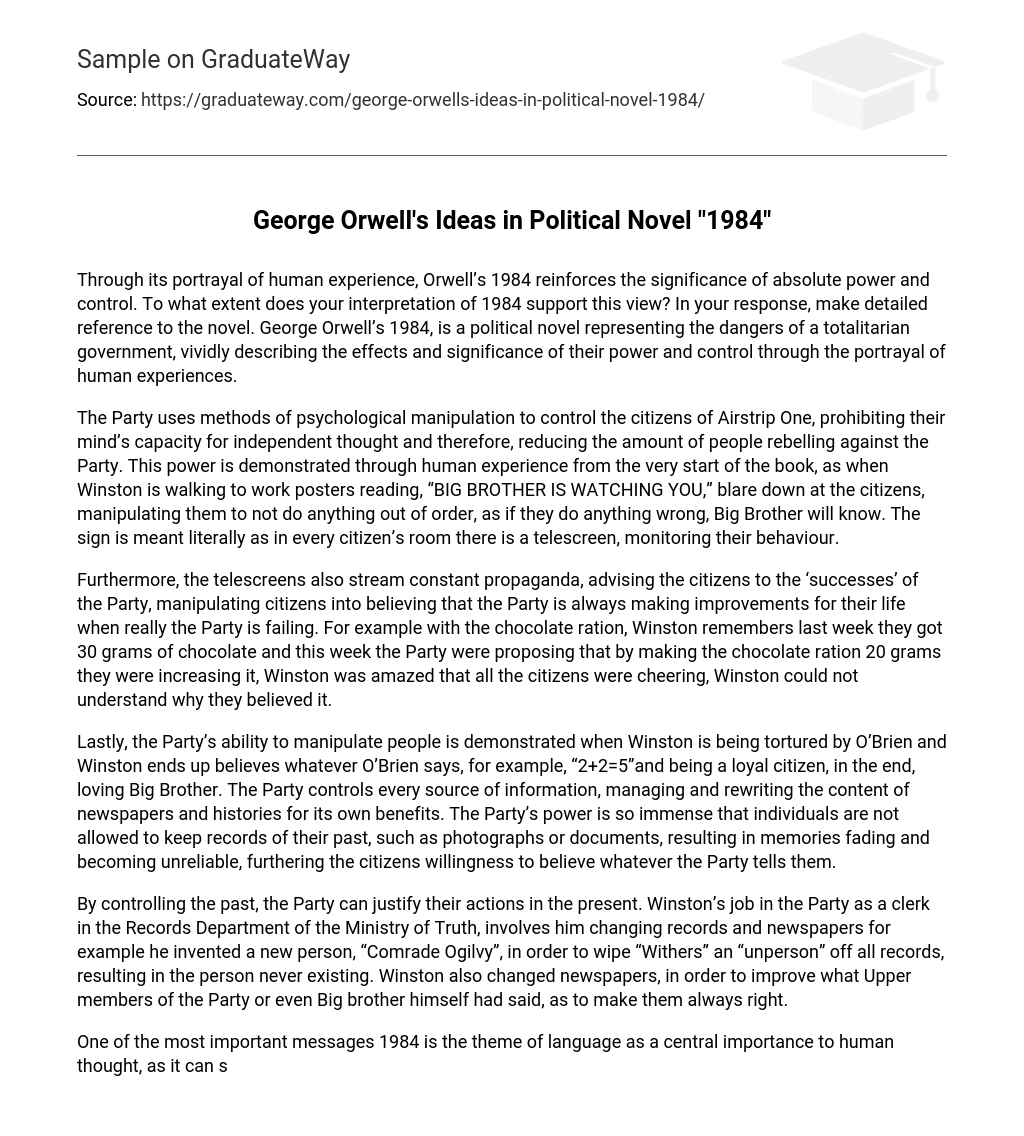Through its portrayal of human experience, Orwell’s 1984 reinforces the significance of absolute power and control. To what extent does your interpretation of 1984 support this view? In your response, make detailed reference to the novel. George Orwell’s 1984, is a political novel representing the dangers of a totalitarian government, vividly describing the effects and significance of their power and control through the portrayal of human experiences.
The Party uses methods of psychological manipulation to control the citizens of Airstrip One, prohibiting their mind’s capacity for independent thought and therefore, reducing the amount of people rebelling against the Party. This power is demonstrated through human experience from the very start of the book, as when Winston is walking to work posters reading, “BIG BROTHER IS WATCHING YOU,” blare down at the citizens, manipulating them to not do anything out of order, as if they do anything wrong, Big Brother will know. The sign is meant literally as in every citizen’s room there is a telescreen, monitoring their behaviour.
Furthermore, the telescreens also stream constant propaganda, advising the citizens to the ‘successes’ of the Party, manipulating citizens into believing that the Party is always making improvements for their life when really the Party is failing. For example with the chocolate ration, Winston remembers last week they got 30 grams of chocolate and this week the Party were proposing that by making the chocolate ration 20 grams they were increasing it, Winston was amazed that all the citizens were cheering, Winston could not understand why they believed it.
Lastly, the Party’s ability to manipulate people is demonstrated when Winston is being tortured by O’Brien and Winston ends up believes whatever O’Brien says, for example, “2+2=5”and being a loyal citizen, in the end, loving Big Brother. The Party controls every source of information, managing and rewriting the content of newspapers and histories for its own benefits. The Party’s power is so immense that individuals are not allowed to keep records of their past, such as photographs or documents, resulting in memories fading and becoming unreliable, furthering the citizens willingness to believe whatever the Party tells them.
By controlling the past, the Party can justify their actions in the present. Winston’s job in the Party as a clerk in the Records Department of the Ministry of Truth, involves him changing records and newspapers for example he invented a new person, “Comrade Ogilvy”, in order to wipe “Withers” an “unperson” off all records, resulting in the person never existing. Winston also changed newspapers, in order to improve what Upper members of the Party or even Big brother himself had said, as to make them always right.
One of the most important messages 1984 is the theme of language as a central importance to human thought, as it can structure and limit the ideas that individuals are capable of formulating and expressing. The Party creates “doublethink”, the ability to believe and disbelieve simultaneously in the same idea, or to believe two contradictory ideas simultaneously. It provides the psychological key to the Party’s control. Doublethink allows citizens under Party control to believe slogans like “War is Peace” and “Freedom is slavery”. Newspeak”, Winston is told by Syme, is the language the Party have created in order to narrow down the range of thought to render thought crime impossible. They believe if there are no words in a language capable of expressing rebellious thoughts, no one will ever be able to rebel, or even conceive of the idea of rebelling. Syme gives Winston and example, “If you have a word like ‘good’, what need is there for a word like ‘bad’? Ungood will do just as well…
Or again, if you want a stronger version of ‘good’, what sense id there in having a whole string of vague useless words like ‘excellent’ and ‘splendid’… ‘Plusgood’ covers the meaning; or ’doubleplusgood’ if you want something stronger still. ” 1984 is not just about totalitarianism; it makes us live through totalitarianism from the perspective of Winston and citizens of Airstrip One. The Party wants power for its own sake. They monitor the behaviour of all its members. Morning group exercises are mandatory. They demand loyalty to the Party.
They recognise no concept of ‘family’ other than the collective family under rule by the Party. The Party controls everything – the past, the present, and the future – by controlling historical records, language, and even thought. The Party tortures and ‘vaporizes’ those who are rebellious and they suffer through constant warfare. The conditions which the citizens live under are appalling although they do not know any better and different classes generally do not socialize with each other. These experiences that the citizens, Winston and Julia are put through demonstrate the effects and significance of absolute power and control.





